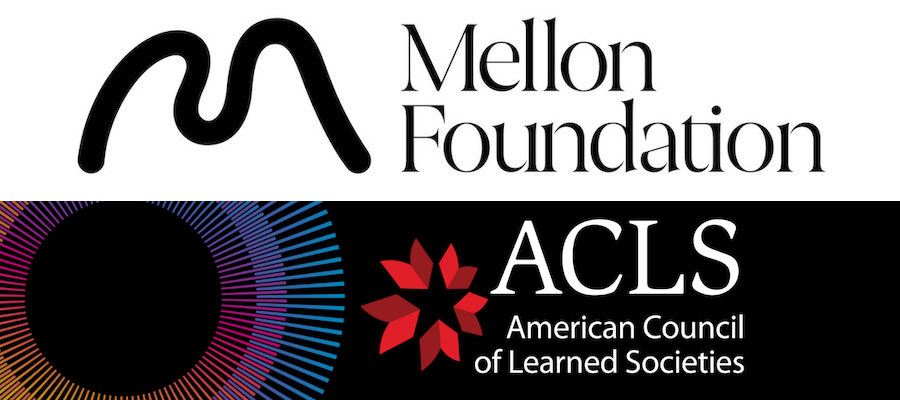American Council of Learned Societies (ACLS) invites applications for Mellon/ACLS Dissertation Innovation Fellowships, which provide a year of support for doctoral students preparing to embark on innovative dissertation research projects. This program is made possible by a grant from the Mellon Foundation.
Mellon/ACLS Dissertation Innovation Fellowships support graduate students in the humanities and social sciences who show promise of leading their fields in important new directions. The fellowships are designed to intervene at the formative stage of dissertation development, before research and writing are advanced. The program seeks to expand the range of research methodologies, formats, and areas of inquiry traditionally considered suitable for the dissertation, with a particular focus on supporting scholars who can build a more diverse, inclusive, and equitable academy.
ACLS believes that humanistic scholarship benefits from inclusivity of voices, narratives, and subjects that have historically been underrepresented or under-studied in academe. We especially welcome applications from PhD candidates whose perspectives and/or research projects cultivate greater openness to new sources of knowledge, innovation in scholarly communication, and, above all, responsiveness to the interests and histories of people of color and other historically marginalized communities, including (but not limited to) Black/African American, Hispanic/Latinx, and Indigenous communities from around the world; people with disabilities; queer, trans, and gender nonconforming people; and people of diverse socioeconomic backgrounds. We also believe that institutional diversity enhances the scholarly enterprise, and we encourage applications from doctoral students from all types of institutions in the United States.
The program supports projects that push the traditional approaches to dissertation research in new directions. The strongest applications will show evidence of thoughtful plans for engaging the sources, resources, scholars, and communities – on campus and/or off – necessary to advance their projects. Fellows might design a fellowship year that includes:
- directed interdisciplinary research and methodological training that pushes beyond the scope of their field’s norms with faculty within and/or outside their home institutions;
- exploration of new modes of scholarly communication and dissertation design;
- intensive digital methods training and research;
- collaboration with community partners;
- a short-term practicum with a non-academic organization (such as a think-tank or social justice organization) to develop experience with applied methods, site-based research involving community-engaged or collaborative approaches.
The list above is by no means exhaustive. ACLS seeks to support a range of innovation in doctoral research — practical, trans- or interdisciplinary, digital, collaborative, critical, or methodological — as well as innovative forms and modes of publication.
ACLS has long supported interdisciplinary work and collaboration with partners outside of the academy through our various fellowship programs, and the program would welcome proposals from graduate students, in consultation with advisors and/or departmental directors of graduate study, that engage with scholars from other institutions, disciplines, or outside of the academy.
These fellowships also support the expansion of an applicant’s advisory network through external mentorship. The external mentor, who might come from another division of the university, another academic institution, or from beyond the academy, should be selected for the mentor’s capacity to offer critical perspective and expertise on the fellow’s project.
ACLS will award up to 45 fellowships in this competition for a one-year term beginning between July and September 2024 for nine to twelve months, covering the 2024-25 academic year. The fellowship may be carried out in residence at the fellow’s home institution or at any other appropriate site for the research. These fellowships may not be held concurrently with any other fellowship or grant.
Eligibility
This program intends to intervene at the formative stages of project development. Given the variation in graduate student trajectories, and the variation of curricular requirements across departments and schools, this program gives only broad parameters for the eligible period of tenure of the fellowship. Some applicants may be applying in the year immediately before candidacy to support the first year of work as a PhD candidate; others may seek to expand their field/methodological horizons at an earlier stage of their graduate studies. The program requires applicants to have completed all required coursework in their doctoral curriculum by the time the fellowship commences. Individuals must be enrolled full-time and may not accept teaching or research assistantships, other major fellowships, internships, or similar internal or external awards during fellowship tenure.
Applicants must:
- Be a PhD student in a humanities or social science department in the United States.
- Be able to take up a full year (9-12 months) of sustained specialized research and training, released from normal coursework, assistantships, and teaching responsibilities.
- Have completed at least two years and all required coursework in the PhD programs in which they are currently enrolled by the start of the fellowship term.
- Have not advanced to PhD candidacy/ABD status prior to January 1, 2023.
